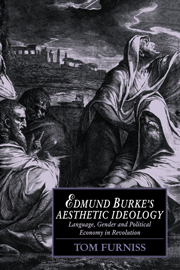Book contents
- Frontmatter
- Contents
- Acknowledgements
- Note on texts
- Introduction
- PART ONE AESTHETICS FOR A BOURGEOIS REVOLUTION
- PART TWO REFLECTIONS ON A RADICAL REVOLUTION
- 5 The genesis of the Reflections: resisting the irresistible voice of the multitude
- 6 Stripping the queen: Edmund Burke's magic lantern show
- 7 A revolution in manners: chivalry and political economy
- 8 Reform and revolution
- 9 Imaginary constitutions and economies
- 10 Speculation and the republic of letters
- Notes
- Index
10 - Speculation and the republic of letters
Published online by Cambridge University Press: 18 February 2010
- Frontmatter
- Contents
- Acknowledgements
- Note on texts
- Introduction
- PART ONE AESTHETICS FOR A BOURGEOIS REVOLUTION
- PART TWO REFLECTIONS ON A RADICAL REVOLUTION
- 5 The genesis of the Reflections: resisting the irresistible voice of the multitude
- 6 Stripping the queen: Edmund Burke's magic lantern show
- 7 A revolution in manners: chivalry and political economy
- 8 Reform and revolution
- 9 Imaginary constitutions and economies
- 10 Speculation and the republic of letters
- Notes
- Index
Summary
According to Foucault, one of the problems which faced physiocratic economic thought in the second half of the eighteenth century concerned the creation of value. While all commodities could be said to originate in the land, they only assume the status of wealth through being exchanged. Wealth, then, is construed out of those goods which exceed the agricultural capitalist's immediate needs. This excess has to be derived from a source which will not be depleted by the process of continually yielding a profit. In Foucault's analysis of physiocratic thought, neither trade nor industry is capable of providing ‘this necessary supplement’ – on the contrary, entrepreneurial activity creates wealth only at the expense of others, and the value it creates ‘arises only where goods have disappeared’ (Order of Things, pp. 193–4). Foucault's use of the term ‘necessary supplement’, in the year before the publication of Derrida's Of Grammatology, seems unaware of its contradictory possibilities, yet we can see how these reassert themselves in Foucault's analysis. While manufacturing capitalism creates profit by depleting ‘natural’ wealth, agricultural capitalism derives its surplus from a nature regarded as ‘an inexhaustible source of the goods that exchange transforms into values’ (Order of Things, p. 195). Nature is inexhaustible because it is backed by what Mirabeau calls ‘the Author of nature, the Producer of all goods and all wealth’. As Foucault suggests, the agricultural labourer or farmer enters into partnership in this productivity, becoming a ‘Co-Author’ in an agrariancum- literary economy (Order of Things, p. 194).
- Type
- Chapter
- Information
- Edmund Burke's Aesthetic IdeologyLanguage, Gender and Political Economy in Revolution, pp. 243 - 265Publisher: Cambridge University PressPrint publication year: 1993



